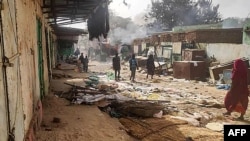Air strikes and anti-aircraft missile fire have rained down again on Omdurman and Khartoum, two of the three cities that make up Sudan's wider capital.
But the war has in recent days heated up in cities to the west of the capital, in the fragile Darfur and Kordofan regions.
The worst fighting has been in West Darfur, where militias backed by the Rapid Support Forces razed areas of the city and forced a mass exodus, residents and human rights monitors said.
The West Darfur city of El Geneina has been batterred by repeated militia attacks.
In al-Fashir, capital of North Darfur state, a fragile truce fell apart as the two forces clashed in residential areas.
And in El Obeid, capital of North Kordofan and a transport hub between Khartoum and Darfur, where the RSF maintains significant presence, the paramilitary force clashed with the heavily armed Central Reserve Police.
In recent days, fighting had also picked up between the army and RSF in Nyala, capital of South Darfur and one of Sudan's largest cities. Clashes continued on Friday in the south of Nyala, and a resident said civilians were killed but could provide no further details.
A new front in the fighting is also threatening to open in South Kordofan, where the rebel SPLM-N controls some areas. The army earlier this week accused the force of violating a long-held cease-fire agreement.
The fighting has caused more than 2.5 million to be displaced, hundreds of thousands of whom have fled across the border, including to Chad and Egypt.
It has created a humanitarian crisis with NGOs struggling to provide much needed medical and food aid.
The United States said on Thursday it had suspended talks which had so far presented the only forum for discussions between the two sides, though it only resulted in short, often-violated humanitarian ceasefire agreements.






![WFP: Sudan Donor Pledge Short of Meeting Humanitarian Needs [3:42]](https://gdb.voanews.com/01000000-c0a8-0242-3eec-08db60377484_w33_r1.jpg)
![ICRC: Sudan Warring Parties Must Protect Humanitarians [4:00]](https://gdb.voanews.com/47ee21bc-f5f0-4ef0-8a82-c3e41045500e_w33_r1.jpg)






Forum